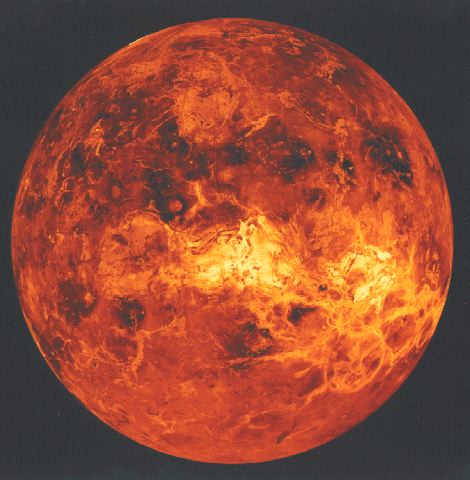(Image of Venus from NASA via Wikimedia)
Italy sold two-year debt at a negative yield for the first time on Tuesday… The sale gains Italy entry to a select group of countries including Germany, France and Switzerland whose borrowing rates have turned negative as investors prove willing to buy their debt at any price.
“This is an Alice in Wonderland situation,” said Andrew Milligan, head of global strategy at Standard Life Investments. “Negative rates are highly strange..
Financial Times, 27 October 2015[1]
Keeping it down to Earth
On Planet Earth, they once had a system whereby a Government, needing to spend, could borrow by issuing bonds for a defined period at a given but positive (above zero) annual rate of interest.
The Government was called a Sovereign Debtor, who then owed the outstanding principal and specified annual interest to his Creditor, the bond-holder.
Under this system, the Government would borrow, say, the sum of £100 for a term of 10 years at 3% annual interest. Provided the Government paid the £3 to the Creditor each year, and paid back the £100 (in nominal value) at the end of the term of 10 years, all was well.
Should the Government be unable or unwilling to pay any interest payment, under the terms of the bond contract, it would be in default, and be liable to pay the full principal plus interest (with compound interest on arrears) all in one go. They even created special Vulture Funds to ruthlessly pursue defaulting governments for the full amount of principal and (compound) interest. Creditors liked this system.
They do things differently on Venus
On planet Venus, by contrast, a different system evolved. Here, a Government might be persuaded to “borrow”, but always declined to do so if asked to pay a positive rate of interest. Instead, it was the custom for “lenders” to ritually petition the Government asking it to receive and look after their money, for which they were required to pay the Government an annual sum.
Had they imagined such a strange system, earthlings might have invented a descriptive term such as “negative rate of interest”, or “negative yield”, for the privilege of making the “loan”.
For example, a Government might be persuaded to receive (“borrow”) V100 (the Venusian currency) for a term of 10 Venusian years, on contractual terms that the “lender” – to use earthly language – would make an annual payment of £3 to the “borrower”, i.e. at a “negative rate of interest” of 3%.
To deal with this different context, a different vocabulary had of course evolved. Instead of having Sovereign Debtors, on Venus they were known as “Sovereign Receivers”. And instead of having Creditors, on Venus there were “Fund-Depositors”.
If the Fund-Depositor failed to make his annual payment to the Sovereign Receiver, the Sovereign Receiver could either deduct the non-payment, with a positive but penal rate of interest in the interim, at the end of the term, or it could treat this as a default, enabling it to pay back the V100 forthwith, minus future interest payments due and minus compound interest on any arrears.
I should add that Venus did have “banks”, but by long Venusian tradition their functions were generally limited to the provision of hot-money-laundering services (thanks to their absolute advantge of being closer to the Sun), and making pay-day loans. More respectable Fund-Depositors did not trust these “Venereal” banks, as they were known, so preferred to pay their Sovereigns who were deemed to be a somewhat more wholesome risk, and give themselves a sporting chance to “palm off” (technical term for “sell”) their deposit-vouchers to other would-be Fund-Depositors at a profit.
To Voldly go..
Some Venusians in due course thought it might be better to deposit with the Sovereign not a sum of currency but a fairly rare bar of metal of pre-determined quality, known as Vold. The Sovereign then agreed to look after the Vold bar for a defined fixed term, upon payment by the Vold-Depositor of an annual fee, which represented a certain percentage, fixed or variable, of the value of the Vold deposited.
There then emerged alternative forms of Vold deposit – in some cases, the Depositor was entitled to the return of the specific Vold bar, in which case the Depositor continued to own the bar, but in other cases, the contract provided for the return of a bar of Vold of equal value – which meant that they no longer owned the deposited bar, but had a contractual claim on the Sovereign Receiver for the return of an equivalent Vold bar.
A Venusian space-time traveller to Earth once tried to explain this latter practice, which they called Sovereign Voldsmithing, but it never caught on in such a different climate.
What, why, wow
Meanwhile back on Earth, the Financial Times had tried despairingly, back in 2015, to explain the mysteries of the Venusian system to a largely bemused audience, “Negative yields Q&A: what is the rationale?”
But only those visiting from Planet Pluto – commonly known as “the Plutocrats” – really got it.
[1] Italy’s gross government debt is currently circa 130% of GDP






3 responses
The trick is to stop thinking of money as an asset. Then negative interest starts to make sense: http://malcolmhenry.com/2013/11/18/the-positives-of-negative-an-idea-to-change-the-world/
I fear that some of this commentary is coming from Uranus
Galileo, I feel your lack of scientific objectivity Mars your argument, aggravated by your evident Saturnine distemper.